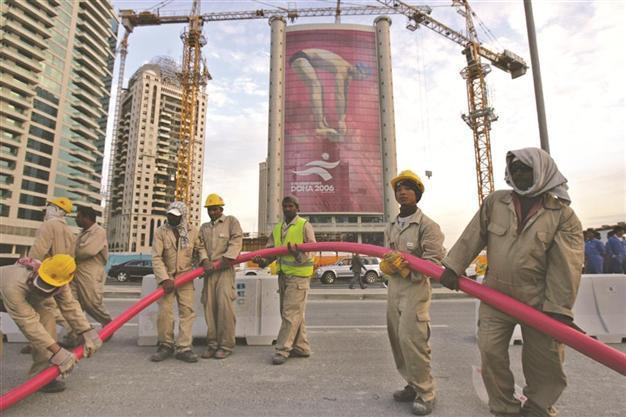Qatari labor conditions in focus as FIFA debates 2022 World Cup
JAMES M. DORSEY

File photo shows Asian workers in Doha, before the opening ceremony of the 2006 Asian Games. Campaigners call on Qatar to change its policy towards migrant laborers preparing for the 2022 World Cup, following an investigation by British newspaper the Guardian alleging “modern day slavery”. AFP PHOTO / GOH CHAI HIN
Controversy over conditions for unskilled and semi-skilled workers in Qatar involved in the construction of World Cup-related infrastructure, as well as for flight attendants of Qatar Airways, has moved center stage as world football body FIFA prepares to debate the Gulf state’s hosting of the 2022 tournament.
FIFA’s focus is on whether to move the tournament from summer to winter because of Qatar’s harsh summer temperatures that can exceed 40 degrees Celsius. FIFA, however, will find it difficult to maintain a narrow concern for the welfare of players with no regard to the army of workers involved in constructing billions of dollars in World Cup-related infrastructure. Beyond reputational damage, the debate over workers’ rights and conditions increases the risk of FIFA being pushed to entertain depriving Qatar of its hosting rights, a move that would be perceived by much of the Muslim world as anti-Arab and anti-Muslim.
International trade unions have for the past three years threatened a boycott of the World Cup if Qatar failed to improve labor conditions and accept workers’ rights to form independent trade unions and collectively bargain. The issue has taken on added urgency with a report in The Guardian that asserts that 44 workers died in work-related incidents between June 4 and Aug. 8 and that workers had not been paid, had their passports confiscated by employers, been denied access to free drinking water in the desert heat, and that 30 Nepalese had sought refuge at their embassy in Doha to escape brutal labor conditions.
Adding to Qatar’s problems, the International Transport Workers’ Federation (ITWF) lambasted this week Qatar Airways, the country’s national carrier, as well as United Arab Emirates carriers Emirates and Etihad for prohibiting employees from organizing and demanding better working conditions. ITWF said it would lobby the International Civil Aviation Organization (ICAO), which is meeting in Canada to take action against the Gulf carriers.
Union problem The union objects to stipulations in Qatar Airways contracts that oblige employees to obtain company permission before changing their marital status and entitle it to fire female employees as soon as they become aware of a pregnancy.
Union objections on the grounds that Qatar bans independent labor organizations forced the Gulf state earlier this year to withdraw its proposal to move ICAO headquarters from Montreal to Doha.
Qatar Airways CEO Akbar al-Baker was quoted by Arabian Business as saying at the time: “If you did not have unions you wouldn’t have this jobless problem in the Western world… It is caused by unions making companies and institutions uncompetitive and bringing them to a position of not being efficient. If you go and ask the politicians in most of the countries in the Western world, they would love to have the system we have: where the workers have rights through the law but they do not have rights through striking and undermining successful institutions that provide jobs to their knees.”
Qatar has responded to international criticism of its labor conditions by seeking to improve working and living conditions, including stricter enforcement of timely payment of wages, limiting the number of workers permitted to live in one room, planning a city for foreign workers who account for 94 percent of the Qatari workforce and enhancing leisure opportunities, including the creation of a football league for foreign workers.
The Qatar 2022 Supreme Committee that is responsible for organizing the World Cup issued a Workers’ Charter earlier this year that pledged to meet international standards with the exception of the right to independent trade unions and collective bargaining. The Qatar Foundation, the institution that funds educational and social projects, is working on a similar charter. It is also looking at streamlining recruitment to cut out middlemen and agents that charge onerous rates and are responsible for workers’ huge debt burden.
Qatari executives note that one offset of the awarding of the World Cup is the fact that workers’ rights and working conditions are on the table and that steps are being taken to address the situation.
“While construction on work relating directly to the 2022 FIFA World Cup in Qatar has not yet commenced, we have always believed that hosting the 2022 FIFA World Cup in Qatar could be the catalyst for positive change, particularly for accelerating human and social development in Qatar,” the 2022 committee said. The committee said the government was investigating companies identified in The Guardian report.
